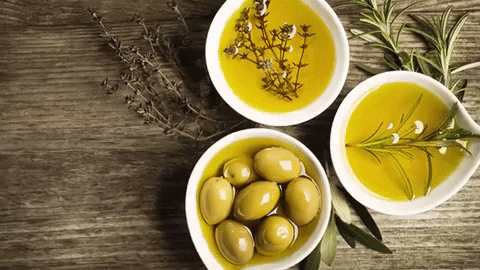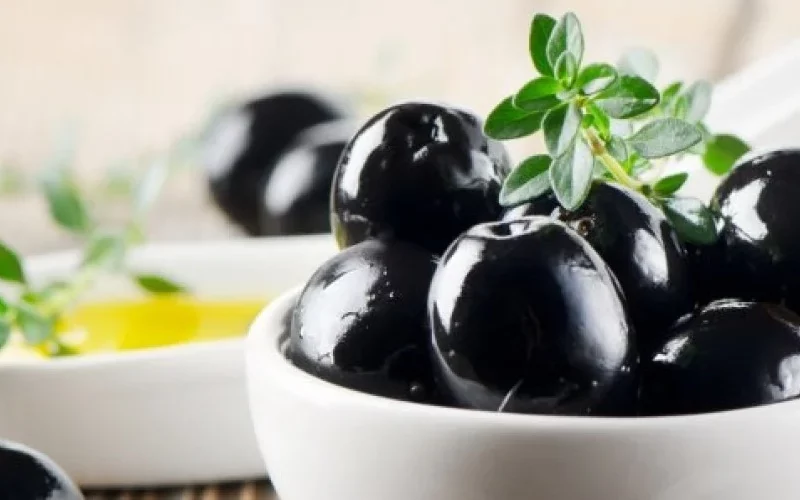Olives are delicious on a pizza, as a snack and in a salad. In this article you can read how healthy olives are and what effects they have on your body.
You will also find out if olives help you during weight loss .
Contents:
- Facts about olives
- Why the olive is healthy
- Nutritional value
- Olives and pomace
Facts about olives

- Olives are actually a type of fruit.
- They grew in South Asia 6000 years ago and were then spread to other countries in the Mediterranean basin.
- Olives also grew in Crete around 3000 BC, and they have even been found in Egyptian tombs dating back to 2000 BC.
- A few hundred years ago, North America, South America, Japan, New Zealand and Australia were introduced to olives.
Why the olive is healthy
Olives are rich in healthy fats and antioxidants . In addition, these fruits contain vitamin E. That gives olives important benefits for your health. Below we list seven health benefits for you.
1. Good for heart and blood vessels
Olives are high in antioxidants, including hydroxytyrosol . This substance contributes to thinning the blood, which can help reduce the risk of a blood clot [2].
Hydroxytyrosol can also help to reduce stress on the heart and increase blood flow in the body. This is possible because this antioxidant helps the blood vessels to dilate and reduce tension [3].
Summary: Olives may help dilate blood vessels so that blood can flow properly.
2. Beneficial for cholesterol and blood pressure
Olives are rich in unsaturated fat, also known as oleic acid . Research has shown that oleic acid can help lower blood pressure, which promotes heart health [2,4].
There are also indications that the healthy fats in olives can contribute to a healthy cholesterol level [2,4]. Black olives can also help prevent cholesterol from oxidizing [5]. The latter is important for the blood to flow properly.
Summary: Olives contribute to healthy cholesterol levels and lower blood pressure.
3. Can help reduce allergic reactions
A study published in Immunobiology has shown that the antioxidant hydroxytyrosol in olive oil extract plays an important role in helping to counteract allergic reactions [6].
There are scientists who, based on their research, conclude that a high intake of olive oil may have some protective effects on asthma and allergic complaints in childhood [7].
Use olive oil as the basis of healthy salad dressings to take advantage of this protective effect.
Summary: There is some evidence that olive oil may protect against asthma and allergy symptoms.
4. Contributes to sufficient iron
Red blood cells need iron to carry oxygen in the blood. An iron deficiency can have many consequences for your health. For example, this can make you feel very tired. Eating olives contributes to sufficient iron in your body.
Black olives in particular contain a lot of iron: about 3 milligrams per 100 grams [2,8,9]. For a good absorption of this mineral, it is best to eat fruit or vegetables with vitamin C. Think, for example, of Brussels sprouts, bell peppers, oranges , kiwis and strawberries .
Summary: With olives (especially the black ones) you get quite a bit of iron.
5. Supports the health of our cells
Antioxidants protect the body’s cells from free radical damage. Olives are a rich source of antioxidants. For example, black olives contain a lot of vitamin E , which can help reduce the risk of cell damage [5].
The oleic acid in olives also supports the health of our cells. It can help prevent cells from behaving differently than intended. In addition, oleic acid has a purifying effect, which contributes to the reduction of cell damage caused by free radicals [2,4].
The terpenoids and squalene in olives can also contribute to healthy cells [4].
Summary: Eating olives may help prevent cell damage.
6. Good for the joints
Olives contain various substances that have a beneficial effect on our joints. Think oleic acid and phenols . Both substances have been studied and have shown that they can have anti-inflammatory effects [15]. There is also evidence that phenols can help reduce cartilage and bone breakdown [16].
There are even studies showing that eating olives can protect against rheumatoid arthritis [10]. Other natural products that can help with joint problems are turmeric , cherries , pomegranate and cocoa .
Summary: The purifying compounds in olives help keep joints healthy.
7. Beneficial for eyesight
Vitamin A from olives is very important for good eyesight. This vitamin ensures that we can see well in low light. A deficiency of vitamin A can even lead to night blindness [11].
Vitamin A is also important for proper lubrication of the eye [11]. In addition, this vitamin can provide protection against age-related eye disorders, such as macular degeneration (with a decrease in vision) and cataracts (clouding of the lens of the eye) [12].
Summary: Olives may contribute to good eyesight.

Nutritional value of olives
A 28-gram serving of green olives contains the following nutritional values [13]:
- Energy: 41 kcal (calories)
- Carbohydrates: 0 grams
– Sugars: 0 grams - Proteins: 0 grams
- Fats: 4 grams
- Fibres: 1 gram
Vitamins and Minerals:
- Vitamin A: 2% DV
- Vitamin E: 5% DV
- Calcium: 1% DV
- Magnesium: 1% DV
- Sodium: 18%
- Copper: 2% DV
In addition, green olives contain 0.5 milligrams of iron per 100 grams [9]. That’s 3% of the recommended daily allowance for women before menopause . For men and women after the menopause, this is 5% of the recommended daily allowance of iron [14].
Olives and pomace
You can eat olives perfectly while losing weight. Unlike most fruits, olives (like avocados ) contain almost no sugar.
Note: It is important not to eat too many olives, as they contain a lot of sodium (salt) and this can disrupt the fluid balance in the body.
Weight loss tip: Try to vary enough with different foods during weight loss. When you do this, you get the vitamins and minerals from olives, but don’t eat too much salt. That way, eating olives doesn’t have to get in the way of losing weight.




